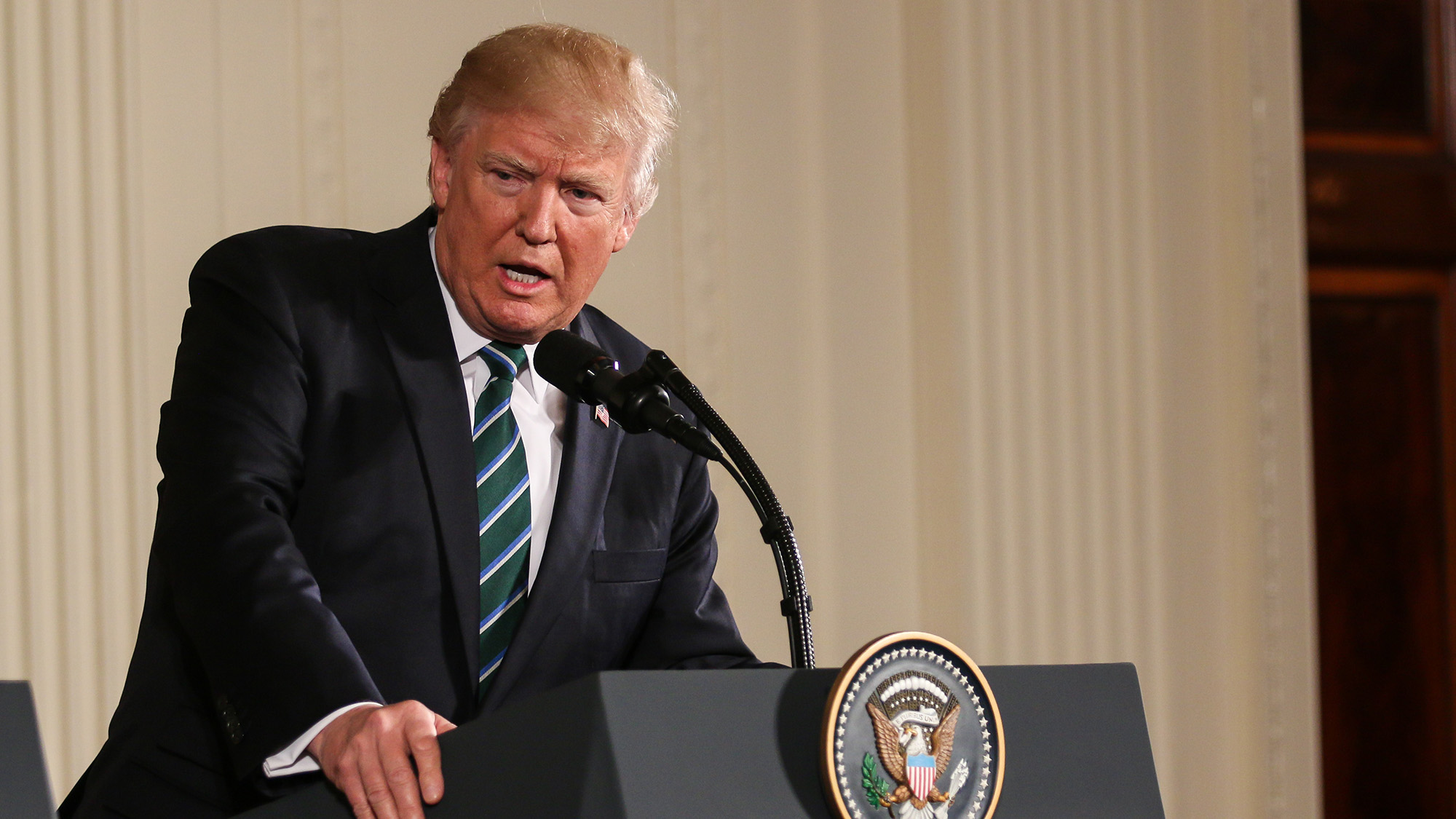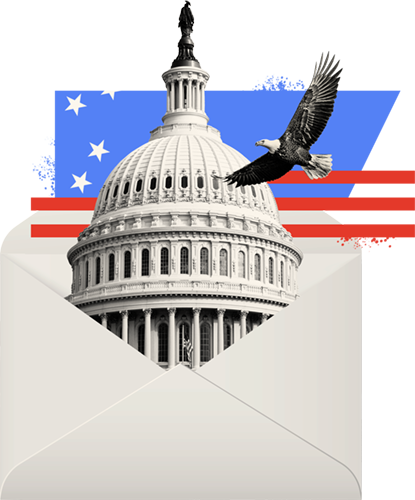

Former President Donald Trump has claimed that the presidential pardon power is “complete,” free from limitations. While various administrations, both Republican and Democratic, have rebuffed efforts to curtail the pardon power, Trump’s claims are of an order of magnitude more extreme. They include, for example, the claim that the president has an “absolute right” to pardon himself.
In practice, as president, Trump also supercharged abuses of the pardon power, twisting a power intended to serve the public interest into a tool for self-dealing. As a Washington Post investigation of all clemency acts during his tenure concluded: “Never before had a president used his constitutional clemency powers to free or forgive so many people who could be useful to his future political efforts.” This included a record number of pardons for white-collar criminals who would go on to provide political and financial support to the former president.

Presidential pardons can generate controversy. But certain types of pardons are more than just controversial: some violate core constitutional provisions and principles. Below we review the constitutional boundaries of the pardon power—and which kinds of pardons fall outside of them.
Article II, Section 2 of the Constitution vests the president with a broad but limited power “to grant Reprieves and Pardons.” According to the Supreme Court, the pardon power is intended as a tool for justice and mercy (an “act of grace”) and to further “the public welfare.” As one federal court has held: “The President, who exercises that power as the elected representative of all the People, must always exercise it in the public interest.”
Read our full report: Checking the Pardon Power Read our full report: Checking the Pardon Power
While the presidential pardon power is expansive, it is not, according to federal courts, “limitless.” To the contrary, as “part of the Constitutional scheme,” it is subject to several express and structural constitutional constraints. The Pardon Clause makes explicit that pardons may only extend to “Offenses against the United States,” meaning state criminal offenses and civil liability are not pardonable, and that they may not be granted for “Cases of Impeachment.” But these are not the only limitations. As the Supreme Court explains, limitations may otherwise be “found in the Constitution.” In particular, four categories of pardons violate core constitutional provisions and principles and constitute abuses of power:
Two kinds of pardons would function to place a president above the law: a self-pardon and a self-protective pardon (that is, a pardon that has the intent and effect of impeding an investigation into a president or his interests and that would thus amount to a self-pardon).
Broadly, these pardons would violate the president’s duty to faithfully execute the law as prescribed by the Constitution’s Take Care Clause and Oath Clause—both of which bind the president to exercise his powers in a way that serve the public’s interest, not for “self-dealing, self-protection, or other bad faith, personal reasons.” Such pardons would also run afoul of the power’s purpose as articulated by federal courts to further “the public welfare.” Former Supreme Court Chief Justice and President Howard Taft reflected that “[t]he only rule he [a president] can follow is that he shall not exercise it against the public interest.”
Additionally, self- and self-protective pardons would violate the due process principle articulated by James Madison that “[n]o man is allowed to be a judge in his own case, because his interest would certainly bias his judgment”—a principle invoked by the Supreme Court in order to prevent gross conflicts of interests among public officials. Pardoning necessitates judgment; and no man, the Court has long made clear, can fairly exercise judgment over himself. The Department of Justice relied on the same principle when it concluded that “the President cannot pardon himself.”
Finally, such pardons violate the central constitutional principle that ours is “a government of laws, not of men” and that as such, no president is “above the law.” As the Supreme Court has held: “No man in this country is so high that he is above the law.” The president is not a king, but rather “‘of the people’ and subject to the law.” The Framers were explicit that the nation’s presidents, unlike British kings, would be “liable to prosecution and punishment in the ordinary course of the law.” In a direct affront to this principle, self- and self-protective pardons would place a president beyond the law’s reach.
No one power vested with a branch of government can be used to run roughshod over other parts of the Constitution, including constitutional rights. The pardon power is no exception.
For instance, in 1915, the Supreme Court found that the president could not force an individual to accept a pardon that violated his constitutional rights (in this case, his Fifth Amendment right against self-incrimination). “It is to be borne in mind,” the Court wrote, “that the power of the President under the Constitution to grant pardons and the [Fifth Amendment] right of a witness must be kept in accommodation. Both have sanction in the Constitution, and it should, therefore, be the anxiety of the law to preserve both, to leave to each its proper place.”
Nor can the pardon power be used to prevent courts from enforcing orders protecting constitutional rights. Consider a president who pardoned an individual held in contempt of court. The Supreme Court has held that the judiciary’s role in our constitutional system hinges on the ability of courts to prosecute contempt independently—that is, without relying on the executive branch. Such a pardon would subvert a court’s ability to enforce its orders, making “a mere mockery” of the judiciary’s constitutional powers.
Pardons cannot be used to obstruct justice or as part of a bribery scheme. Such pardons would violate certain federal criminal laws enacted by Congress and would thus be unlawful.
For instance, to protect the integrity of and trust in public servants, federal law prohibits public servants from exchanging official acts for anything of value for themselves or their family members. The president is a public servant and a pardon constitutes a clear official act. That’s why, when President Bill Clinton pardoned Marc Rich in 2001 in what some believed could be a quid pro quo for donations, federal prosecutors empaneled a grand jury to investigate.
Additionally, obstruction laws prohibit corruptly motivated actions to hinder a criminal investigation “by means of bribery” or by “corruptly persuad[ing] a witness or potential witness to withhold information about the commission of a federal offense.” Promising a pardon to prevent a witness from cooperating with an investigation would thus constitute obstruction. Consider how President Trump’s counsel discussed the possibility of pardons with Paul Manafort’s counsel. After Manafort’s counsel was told by Trump’s to “sit tight” and that he would be “taken care of,” Manafort refused to cooperate with a grand jury and investigators.
The president cannot exempt himself from criminal laws. And in the event that the president violates the law, he is not immune from liability by virtue of having used an official act to commit the violation.
Granting pardons in order to in effect give license to future lawbreaking would also breach the president’s duty to faithfully execute the law—particularly when the president’s own interests are implicated.
For example, Trump has proposed pardoning those convicted for actions related to the January 6th insurrection for which he is now a criminal defendant. Such pardons would sanction an attempt to violently overthrow the U.S. government, violating the president’s duty to defend the Constitution against domestic enemies as required by his oath of office. While past presidents have granted pardons to armed insurrectionists, those pardons have been for the purpose of mollifying civil unrest, not encouraging it. Trump has explicitly “supported and celebrated” those convicted of crimes related to the insurrection, according to evidence presented by the Justice Department.
Such pardons would also serve the president’s personal interests given his own status as a criminal defendant for his role in the insurrection. As such, they would violate the president’s duty to “take Care that the Laws be faithfully executed”—that is, to exercise presidential powers on behalf of the public interest, not as a means of self-protection.
In the face of potential or actual abuses, each branch of government has a constitutional role to play in appropriately checking the pardon power.
Federal courts may adjudicate disputes over the constitutionality of a pardon, as they have since the early 19th century. In Burdick v. United States, for instance, the Supreme Court held that a president may not pardon someone against his will. Congress may also employ its constitutional oversight prerogatives to investigate abuses of the pardon power, as well as impeach and remove a president from office for abuses. In its articles of impeachment against President Richard Nixon, the U.S. House cited his efforts to obstruct justice by dangling pardons to potential Watergate witnesses. The executive branch itself may investigate criminal abuses surrounding the exercise of the power, as it did when empaneling a grand jury to investigate the Marc Rich pardon in potential violation of federal bribery law.
Still, more can be done to prevent and respond to abuses of the pardon power. The Protecting Our Democracy Act, passed by the U.S. House during the 117th Congress and re-introduced in the 118th Congress, includes reforms to better ensure presidents abide by their duty to exercise the pardon power in the public interest. These include, for instance, tools to improve congressional oversight over pardon matters and clarifications to certain criminal laws as they relate to pardon abuses.
The pardon power is not unlimited. It cannot be used to place the president above the law; to subvert other parts of the Constitution, including constitutional rights; to violate criminal law with impunity; or to license future lawbreaking on the president’s behalf. Like any executive power, it is constrained by the rest of the Constitution, including the duties imposed upon the president to act in the public interest.
However, constraints remain theoretical unless and until those vested with the authorities to effectuate them do so. Congress, the judiciary, and the executive branch itself each have access to critical constitutional tools to appropriately constrain the pardon power in order to prevent its abuse. The specter of any president who intends to abuse the power, or who attempts to do so, must prompt swift responses within our system of checks and balances.